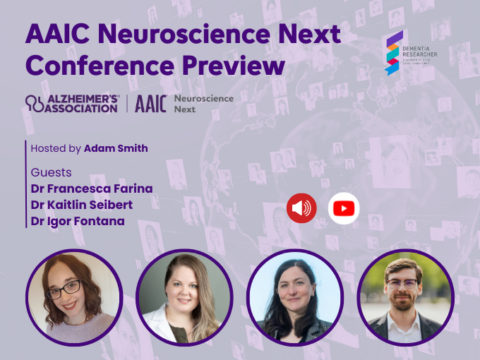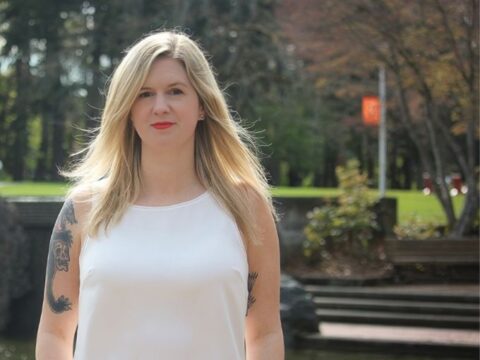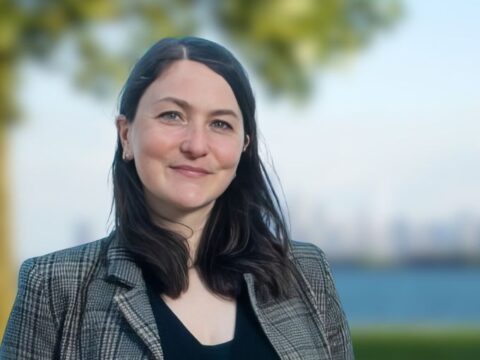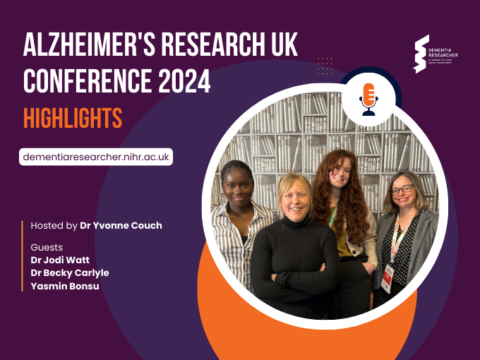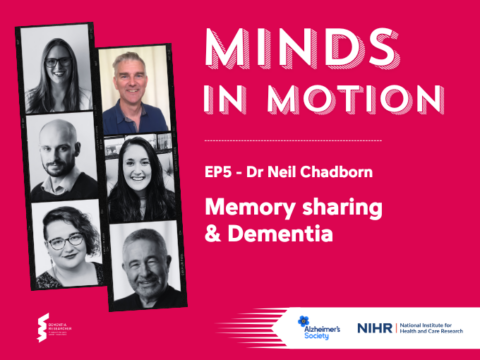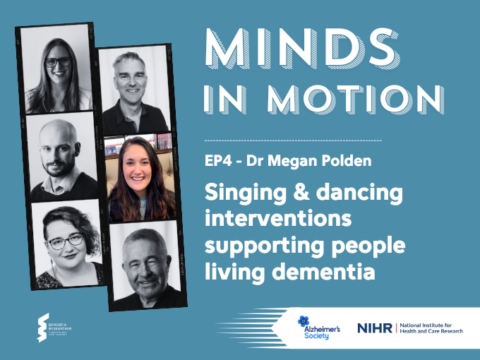In today’s episode, Dr Chi Udeh-Momoh, Research Programme and Biomarker Lead at Imperial College London and GHBI Fellow at University California, San Francisco talks to a line-up of captivating guests as we dive into sharing insights from the AAIC Satellite Symposium 2023 – focussing on the latest research from Latin America.
This week’s guests are all currently GBHI Fellows, and highly respected researchers at their home institutions:
Dr Adolfo M. García, Director, Cognitive Neuroscience Center, Universidad de San Andres / Senior Atlantic Fellow, Global Brain Health Institute, University of California, San Francisco / Associate Researcher, Universidad de Santiago de Chile. Adolfo specializes in language in neurodegenerative diseases.
Dr Alison Canty, Associate Professor, & Atlantic Fellow for Equity in Brain Health at Global Brain Health Institute, Trinity College Dublin / Wicking Dementia Research and Education Centre, University of Tasmania. Alison is researching Neuroplasticity in ageing and neurodegenerative disease.
Dr Jayashree Dasgupta, is a GBHI Fellow and Clinical Psychologist working on translating evidence based practices to develop services for mental well-being, active aging and dementia care in India. She is also an ethics researcher and my work involves highlighting perspectives from under-represented settings into clinical research.
Michelle Moses-Eisenstein, Atlantic Fellow for Equity in Brain Health and Performing Artist at Global Brain Health Institute, University of California, San Francisco. Michelle is committed to improving the lives of people with dementia and their care partners through innovation across arts programs, grants, communications, and policy. She is a creative and empathetic problem solver motivated to achieve public health solutions and health equity through relationship building, advocacy, education, stakeholder engagement, and strategic partnerships.
Dr Chi Udeh-Momoh, Research Programme and Biomarker Lead and currently GHBI Fellow. Chi was I was born in Nigeria and relocated to the UK as a teenager. She has always been fascinated by the brain – how we think, learn and remember; and how these processes can be affected in disease/ alleviated therapeutically. Chi studied Neuroscience all the way through undergrad to PhD, then did my post-doc in neuroepidemiology, her focus is now on Dementia Prevention and biomarkers.
For more information on the event visit:
www.alz.org/satellite-symposium/overview.asp
For more information on GBHI visit:
www.gbhi.org/events/gbhi-annual-conference-2023
Voice Over:
Welcome to the Dementia Researcher Podcast, brought to you by University College London and the NIHR in Association with Alzheimer’s Research UK, Alzheimer’s Society, Race Against Dementia and the Alzheimer’s Association, supporting early career dementia researchers across the world.
Dr Chi Udeh-Momoh:
Hi everyone. I’m Dr Chi Udeh-Momoh and I’m a translational neuroscientist, based of course Imperial College in London, Karolinska Institute in Sweden, and Aga Khan University in Kenya. It’s my pleasure to be hosting this special episode recorded on location from the AIC Satellite Symposium and it’s co-hosted by the Global Brain Health Institute in the very exotic Mexico City. So, these events were started by the Alzheimer’s Association a few years ago, and essentially, they’re a light version of their big international conference, so they put a focus on issues and research taking place in particular parts of the world. And they work to improve accessibility in areas where researchers may not easily be able to afford to attend the bigger international events, like the AIC Conference coming up soon in Amsterdam. So, for our regular listeners, you’ll know how these highlight podcasts work, but for any newbies, it’s a pretty simple format.
I’m joined by four amazing researchers who have been attending this event, the Global Brain Health Institute Conference, as well as the AIC Satellite Symposium. They’re going to share their highlights. They’re going to summarize some of the talks, the posters, and takeaways. The aim is essentially to keep you in the loop even if you can’t attend. I know there were some people able to attend virtually, but the GBHI conference was in person only. But we hope to be able to share some of the work of the brilliant researchers, including those joining me here, working across all areas of discovery, particularly around brain health and dementia. So, let’s meet the guests. I’m delighted to be joined by Dr. Adolfo Garcia, Michelle Moses-Eisenstein, Dr. Alison Canty, and Dr. Jayashree Dasgupta. Say hello everyone. I’m hoping to just start with some introductions, and we can go around the tables to do some introductions. So, Adolfo, would you like to go first?
Dr Adolfo M. García:
Absolutely. I’m the director of the Cognitive Neuroscience Center at Universidad de San Andrés in Argentina, a senior Atlantic Fellow at the Global Brain Health Institute, and a researcher at Universidad de Santiago de Chile. Basically, I work at the interface of language science and cognitive neuroscience. The main thing that we do with our teams is to try to leverage our knowledge about the connections between speech, language, and the brain to try to see if we can find markers, signatures, clues into the integrity of different brain regions, networks, and mechanisms based on people’s speech behavior.
Dr Chi Udeh-Momoh:
Excellent. Thank you so much, Adolfo. And Michelle?
Michelle Moses-Eisenstein:
Hi. Thanks so much for having me. I’m Michelle Moses-Eisenstein. I’m not a doctor, but I’d love to play one on TV at some point. My background is health policy and advocacy as well as government, and in my more personal capacity, not professionally trained, I really enjoy community musical theater, so I also identify as a performing artist.
Dr Chi Udeh-Momoh:
Awesome. Alison.
Dr Alison Canty:
Thank you, Chi. I’m Alison Canty. I am a fellow of the Global Brain Health Institute, but usually I’m based in Hobart at the Wicking Dementia Research and Education Center at the University of Tasmania. In my role there, I do research into neuroplasticity, looking at how the connections of the brain change during aging and in neurodegenerative diseases like dementia and looking at ways to try and restore the plasticity that’s lost in the disease processes. I’m also an educator. We run some really large online programs to try and reach those who need to know about dementia.
Dr Chi Udeh-Momoh:
Excellent, thank you. And Jayashree?
Dr Jayashree Dasgupta:
Hi, Chi. Thanks a lot for having me. I’m Jayashree Dasgupta and I’m currently an Atlantic Fellow at the Global Brain Health Institute at Trinity College Dublin, but I’m a neuropsychologist and a social entrepreneur from India. The work that I do is really around trying to build services for people in the areas of mental health as well as dementia care. A lot of the work that I’m doing is around improving awareness about these conditions, advocacy for this, as well as trying to really understand how we can support carers and leverage the local knowledge in these places to provide support where you don’t have services to meet the needs of the hour.
Dr Chi Udeh-Momoh:
Brilliant, thank you. So, let’s get to the highlights which I’m sure our viewers are hoping to hear about. Alison, would you like to go first?
Dr Alison Canty:
Sure. Thanks, Chi. Well, I was really interested in how the program was put together, to really set the scene for this part of the world and in Latin America. In the first session of the AAIC conference, we really started with hearing about the World Health Organization’s sort of global action plan for dementia. It was nice that we then went down into Latin American situations and which countries have a plan, which ones are planning their plans, and which countries don’t have any plan or have made no progress towards the goals of having a dementia plan.
Then we moved into the Mexican situation, and we found out about the dementia plan here and how it’s going, how it’s being implemented, and the challenges being experienced in this context in this part of the world. What was striking for me at the end is we heard from someone with personal experience, the lived experience of dementia as a carer for someone in this part of the world. That was really striking for me. As the conference continued, it was really good to see how the countries are all starting to work together and we’re hearing about collaborations that are occurring across the countries as we work towards implementing these dementia plans and really collaborative approaches.
Dr Chi Udeh-Momoh:
Excellent. Yeah, I’m really intrigued also to hear Michelle’s perspective, especially from a non-scientist background. So please if you’d like to go next.
Michelle Moses-Eisenstein:
Sure. Well, what you said really resonates, especially in terms of the caregiver perspective. I think one place where we really saw that, and maybe I’m biased because I’m also an Atlantic Fellow based with Chi in San Francisco and we’re not that far from Los Angeles. I love good films and for anyone who was at Keys Bags, Names, Words, the screening, I know Iris was there, it was fantastic. It blew me away. I hope everyone gets a chance to see it. I think what I really took away is that the leadership space of global brain health equity is consistently academic, consistently clinical, consistently scientific and a place of problem solving. And it’s very challenging.
I mean, this isn’t a surprise to anyone. This is the human experience. It’s such a challenge to be vulnerable. Somehow, they got these people in front of a camera who are either people living with dementia, or their care partners and they gave them this empowered space. And it’s a compilation of just really powerful stories. Of course, experts like my mentor, Dr. Lea Grinberg, and her lab at UCSF, and you can sign up at the website if you want to learn more about it. I believe it’s KeysBagsNamesWords.com. That’s where they’re going to send more information through their listserv about the upcoming screenings. But that absolutely blew me away. It’s just wonderful, beautiful stories that I think through their own vulnerability, give a voice to others to tell more stories.
Dr Chi Udeh-Momoh:
Awesome. Did you [inaudible 00:08:05]
Dr Alison Canty:
Yeah, what I found really remarkable about that movie was, it was lots of narratives, lots of stories all woven together, but it’s the same stories occurring across the whole world.
Dr Chi Udeh-Momoh:
Yes.
Dr Alison Canty:
It’s not unique to a particular place. We’re all experiencing the same effects of learning how to care for someone with dementia and to really have that as an empathy-driven approach to sharing those stories was what was really heart touching for me.
Dr Chi Udeh-Momoh:
Yeah. No, absolutely. I mean, couldn’t agree more. I think it also speaks to the need for interdisciplinary or even multidisciplinary collaborative approaches. We can’t only do science and medicine without thinking about the arts, because I think that was really, really powerful at driving the message on the advances, but all the challenges as well of dementia patients that we’re all working towards. So Jayashree, do you want to go next?
Dr Jayashree Dasgupta:
Sure. I mean, I think overall the conference experience was fantastic because unlike… Well, it’s the first conference I’ve attended in person for a while, and it was just amazing to have the opportunity to interact with people whom I’ve reached out to over email on, kind of seen on Zoom over the past pandemic years. I think that’s been my biggest highlight really. I mean, the scientific sessions and everything were fantastic, but just getting to actually meet people who are doing such fantastic work and talk to them has been a real draw for me.
What I felt was really interesting though about the conference was just the way that all these different countries in Latin America are working together and to see that entire body of work and the sense of collaboration is absolutely amazing. Of course, each scientific session had very specific scientific outputs, but what was more interesting as a researcher in the field who’s trying to do some of this work was to actually hear about the challenges that people are facing and the opportunity to discuss this one-on-one or through the breakouts. I think I personally learned a lot from those interactions as well. So that was fantastic.
Dr Chi Udeh-Momoh:
Exactly. Adolfo, what did you think?
Dr Adolfo M. García:
Yeah, well, the main [inaudible 00:10:22] of course, is this podcast, right? I mean, it’s a real perk of all weeks.
Dr Chi Udeh-Momoh:
Exactly.
Dr Adolfo M. García:
Having you here host and making you blush with this-
Dr Chi Udeh-Momoh:
Oh, my word.
Dr Adolfo M. García:
Doesn’t get any better than this, but I will echo the thoughts about the importance of integrating the arts into what we do. That was actually something that cut across the program proper with the brain boosts, right? So, between some of the main sessions, there was an opportunity for some fellows to actually engage in dynamic creativity-based, creativity-driven activities that involved music and dance. I think that’s very good, not just because we believe in the power of art to contribute to our overarching mission, but just because of the mindset that it puts you in before a talk, right? Just create the right mind space for that.
Diversity was a running theme, but it was also something that was incarnated in everything that happened. If you just take a walk around the posters, you will see that they have been produced by people who come from backgrounds as diverse as cinema, the world of music, I don’t know, geriatrics. You have of course your run-of-the-mill scientists, so we have to do that. But there are also crossings with the world of technological development, startups, networks. So that was very, very interesting to see. The topics that were addressed really were focusing on the hotspots of discussion nowadays, anything ranging from biomarkers to education and with a really, I should say, intersectional or transdisciplinary approach, where you can see the whole gamut of aspects that cut across from ranging from our genes and the alleles of the genes to the neuroanatomy of the diseases that we are interested in learning about, to the sociocultural milieus in which all of us operate. So, I think that was fantastic.
The final thing I’ll mention is the eagerness, even the urge from everybody to collaborate.
Dr Chi Udeh-Momoh:
Yes.
Dr Adolfo M. García:
I’m going to echo what you said, but it’s something that you could also feel during the breaks. I mean, everybody was as eager to reach the breaks as they were to listen to the sessions just because it was the right time to network and to make your life easier than it is. But we all know, and we hope for a good reason.
Dr Chi Udeh-Momoh:
Yeah, I mean, thank you so much for rounding up. I think definitely I have to say the brain boosts were one of my favorite activities as well, and it just really helped, again, to put you in that frame of mind to receive more. There was also obviously excellent food. I don’t know how no one mentioned that, but I’ve eaten so much this week.
Dr Adolfo M. García:
I’m just [inaudible 00:13:29]
Dr Chi Udeh-Momoh:
[inaudible 00:13:30] be a foodie.Michelle Moses-Eisenstein:
Speaking of access and health equity, I think we had access to mole every day.
Dr Chi Udeh-Momoh:
Exactly.
Michelle Moses-Eisenstein:
It was great.
Dr Chi Udeh-Momoh:
But I should also speak about the diversity of the panels as well. I don’t know whether that was intentional, but I really want to commend the organizers. I noticed there was a running theme around gender-balanced panels, and that really resonated with me anyways. So, thank you guys so much. I mean, we can talk about these highlights forever, but I just wanted to hear from each of you of something that really stood out and it could be aligned with your research or your work, but what was that message or talk or session that just really stood out for you?
Dr Alison Canty:
Shall I start?
Dr Chi Udeh-Momoh:
Yes, please.
Dr Alison Canty:
So chief for me, one of the messages we heard earlier in the week was really think about how you can change the narrative and to change your language that you use so that you can reach the right people each time, just to be prepared to communicate in the language of the people that you are speaking with. That’s a really important message for all of us as scientists or as educators or as clinicians, to speak the language of the audience so that they understand. Another quote that I heard during the week, which really resonated with me was to feel the fear and then do it anyway.
Dr Chi Udeh-Momoh:
Oh, yes. Oh, yes, yes. JC Melody or… ?
Dr Alison Canty:
Yes, it was her, speaking from South Africa.
Dr Chi Udeh-Momoh:
I’m definitely… that’s now my motto.
Dr Alison Canty:
Feel the fear and do it anyway.
Dr Chi Udeh-Momoh:
And just keep going. Yeah. Thank you. Michelle.
Michelle Moses-Eisenstein:
Sure. So, I love what everyone said about the arts and the importance there. I’ll say the lightning rounds or what do we call… The lightning poster sessions, which you didn’t actually have lightning. If you haven’t watched them yet and you were at all concerned, no actual lightning was used in the creation of these lightning rounds. It was very safe. Very safe.
Dr Chi Udeh-Momoh:
I think it’s like the speed, right?
Michelle Moses-Eisenstein:
Yeah.
Dr Chi Udeh-Momoh:
It’s funny. If you haven’t attended all of these scientific conferences and you’re hearing lightning rounds, do you expect some special effects?
Michelle Moses-Eisenstein:
Yeah, right? We have all the theatrical, we have a lot of actors-
Dr Chi Udeh-Momoh:
Exactly.
Michelle Moses-Eisenstein:
… in the hotel for this session.
Dr Chi Udeh-Momoh:
I see, next conference. [inaudible 00:15:54].
Michelle Moses-Eisenstein:
Yeah, Veronica Rojas really blew me away because she talked about the incredible work that she’s been doing as an artist, the dignity and really the breaking through the barrier of stigma that she’s been able to accomplish to date, as well as some new partnerships that she’s doing with de Young Museum in San Francisco is really cool. Then most importantly, maybe I’m biased because my background is health policy, she closed with advocating for the importance of funding because as we all know, ideas are wonderful, but without funding, what do we really accomplish? I think it was just a beautiful showcase on the power of the arts as a non-pharmacological tool, which really resonated with me because my research is about expanding access to music very broadly, as well as a focus on expanding access to neurologic music therapy in both nursing homes and community settings.
Because neurologic music therapy is evidence-based. I think the best example that I’ve heard recently was you could have a patient, you’re trying to work with aphasia, and maybe with the left brain and atrophy, excuse me, they may have lost their ability to speak verbally, but the right side of the brain is still able to help them communicate through music. That’s something that a certified music therapist can do, in just three simple steps and its life changing. If we can get more people to support the work that Veronica’s doing and music therapists and non-pharmacological tools, the results would be cost savings and just healthier people. So, it was really inspiring to see, as you all said, the space that this meeting created for the arts and the dignity that it can really bring.
Dr Chi Udeh-Momoh:
Absolutely. Thank you. That was beautifully said.
Michelle Moses-Eisenstein:
Thanks.
Dr Chi Udeh-Momoh:
Adolfo.
Dr Adolfo M. García:
Yeah. I think the one thing that stood out for me is the question that remains unresolved, and it concerns education as a-
Dr Chi Udeh-Momoh:
Oh, yes.
Dr Adolfo M. García:
… as a variable. So usually, we try to factor that away when we are forming our groups. We try to make sure that your patient group is matched with your controls in terms of education so that you can rule out the influence of that factor. All right, fair enough. The discussion was set forth today regarding the diversity of educational systems.
Dr Chi Udeh-Momoh:
Exactly.
Dr Adolfo M. García:
Even intraregional. So, it’s just if you take a look at Latin America, I mean, how many years of primary school and how many years of high school are compulsory in the different educational systems across countries? That varies a lot. So, it was interesting to see that it’s not the number of years of education that seems to account for ultimate behavioral performance and brain behavior connections, but actually the completion of certain educational milestones.
Dr Chi Udeh-Momoh:
Yes.
Dr Adolfo M. García:
So having completed primary school or high school, irrespective of the number of years, and a very nice idea was made explicit today by-
Dr Chi Udeh-Momoh:
Stefanie.
Dr Adolfo M. García:
… Stefanie Piña Escudero who said that, “Well, it doesn’t really matter how many years of education you have, but if you complete high school, either after 13 years of education or 10 years of education, depending on your educational system, then you’re better equipped to apply for better jobs and make more money and have better life chances.” And if we’re talking about social determinants of health, that speaks volumes. But there was one issue that was not discussed, and it’s the very nature and validity of the notion of years of education, because what we do is count the years that a person has been in school, and that is not tantamount to education.
Dr Chi Udeh-Momoh:
No.
Dr Adolfo M. García:
Far from it. What we are really measuring is how many years a person has been enrolled in an educational system. That does not mean that they have received it. It is not a measure of education.
Dr Chi Udeh-Momoh:
Absolutely.
Dr Adolfo M. García:
At all.
Dr Chi Udeh-Momoh:
Absolutely.
Dr Adolfo M. García:
You don’t know how much those people have learned. You don’t know what proportion of the expected goals of the curricula have been met. You don’t even know how frequently they attended school. All you know is that for a certain amount of time they’ve been enrolled. So, I want to take this opportunity to bring this topic up because I think that it’s a major case of construct invalidity.
Dr Chi Udeh-Momoh:
Yeah, yeah.
Dr Adolfo M. García:
And all the publications out there. And I can think of very few that actually escape this, are referring to accounting for, factoring out, measuring, or trying to measure the impact of education without actually measuring education.
Dr Chi Udeh-Momoh:
You’ll be pleased to know in our group, we use the highest level of education attained, so educational attainment rather than years as our [inaudible 00:21:06] rate for education. So, I was really excited to hear when Stephanie also put within the context of social determinants of health. Thank you so much, Adolfo.
Dr Adolfo M. García:
Let’s confess that we had rehearsed this. I was just again [inaudible 00:21:18] the right.
Dr Chi Udeh-Momoh:
No, no, no. Absolutely. Wasn’t rehearsed, but it’s great that we’re thinking along the same lines. Jayashree, please.
Dr Jayashree Dasgupta:
No, great. I mean, I absolutely echo what you were saying. This was actually one of the discussions that I thought really stood out for me because I think I want to kind of highlight that it’s not just about the years of education, but the quality of education, that we really need to think about how we can measure that more effectively. This is an area that I’ve been trying to think about and work with, and some of my work is parents talk about the need for more quality education in low- and middle-income countries. They recognize that this is something which is important.
I’m going to take this opportunity to say we need to get more people to think about that because it’s not just a tick box in terms of providing free access to schooling. It’s really about what goes into teaching. It was great to see that there were posters talking about even including education about brain health, because that’s what we really need to do. So, I think that that’s something which was definitely a highlight for me. So, I’m glad we’re using this opportunity to discuss it.
Dr Adolfo M. García:
But the challenges are multifarious, even if you’re actually measuring outcomes or attainment or ultimate attainment, because the truth is that, at least for some educational systems that I’m familiar with, you cannot trust the grades. You cannot trust the scores because governments are under such pressure to falsify the scores that they report for international assessments. I don’t want to say this is happening everywhere, but this is happening.
Dr Chi Udeh-Momoh:
Feel free to be controversial.
Dr Adolfo M. García:
Oh, absolutely. But no, I really do mean it because I think that we all have a general understanding, which paradoxically enough is based on this bogus operationalization of the construct. But we know that education accounts for a wide proportion of the variance in your cognitive outcomes and your neurobiological mechanisms and whatnot. But how do we really bridge that gap and how do we really find measures of attainment that are reliable?
Dr Chi Udeh-Momoh:
Great question. I wonder while we’re on this topic, and I’ll be quite brief, but I wonder whether where we keep thinking about crystallized education, we forget about fluid intelligence.
Dr Jayashree Dasgupta:
Yes.
Dr Chi Udeh-Momoh:
So that’s another thing for the viewers to contemplate because we use education, educational attainment, occupational complexity as our metrics of, for instance, cognitive reserve. But I really like to question that was posed during those sessions around the fact that, well, what are we really measuring with the construct education in itself? We might be missing out on a whole different form of intelligence that’s promoting reserve. But yeah, thank you all so much. I really don’t think we can… If I may, I just want to, in a minute or so, just really talk about one session that was fire for me, which was the GBHI session on intersectionality that was led by our fellow, Dr. Marianela Ibanez. It just really resonated, there were common themes around gaps and challenges, thinking about intersectionality in dementia research, but more importantly, some methodological considerations that were described by another fellow as well, Dr. Tanisha Hill Jarrett in an introductory talk.
That was quite interesting because we’d already, during the GBHI conference, as had all of these talks around leadership, local and global leadership approaches to brain health equity that we [inaudible 00:25:08] but also Professor Anna Luisa Sosa and Professor Luis Miguel gave that excellent keynote. But I think that my absolute favorite session, I guess maybe again like Michelle, I think that given a lot of the research that I do around dementia prevention, I was so blown, and thinking about multi-partner consortium, I was so blown by the work being done in Latin America with [inaudible 00:25:37] that Professor Ibanez talked about and Latin thinkers.
I really loved Maria Carrillo’s comments and I hope that they take this into consideration, talking about the need for collaborative work within these high consortium partners should really be taken seriously. So, I’m hoping to hear more about the excellent work going on in the region. But before we wrap up, we should mention, and I’m sure we’ve done so already, but that all of us have one thing in common. We’re all Atlantic Fellows for Equity in Brain Health. As the new call for applications for 2023 has just… I can’t even believe it’s already open. I was speaking to our director, Dr. Victor Valcourt, like, “Hang on a second. The call for 2024 is already open. Wow.” So, I wonder if I could just ask you all to say in just one sentence, what advice would you give to someone who’s thinking of applying?
Dr Alison Canty:
Go for it. Take a risk, acknowledge the fears, and do it anyway. For me, it’s been a fantastic opportunity to broaden my perspectives and horizons and to meet and tap into an amazing network of like-minded people.
Dr Chi Udeh-Momoh:
Excellent. Thank you.
Michelle Moses-Eisenstein:
Yeah, it’s been an absolute dream. I’m not ready for it to end. So, two pieces of advice, if that’s okay. So, one, in your application, make sure you describe how you give back to the communities that you’re a part of. Then it’s also never too early to come talk to us. If you go, I think to gbhi.org and search for the Fellows directory, we all have similar email addresses and I’d love to talk with interested applicants and you can just get more kind of customized advice, depending on what your background is or what country you’re coming from. So, I would definitely get some custom advice, depending on who you see in that Fellows directory and what kind of people really resonate with you.
Dr Chi Udeh-Momoh:
Yeah, absolutely. Adolfo.
Dr Adolfo M. García:
It catapulted my career, absolutely.
Dr Chi Udeh-Momoh:
Same.
Dr Adolfo M. García:
But in very, very concrete, non-abstract ways, just giving me access to data sets, to expertise, to grantsmanship that I needed to really hone. As a result of that, the access to funding opportunities was just beyond my wildest dreams. So, I guess if I were to give one piece of advice to someone interested in applying, it would go beyond the curriculum. Do not restrict your goals to what GBHI is offering explicitly. Just go beyond that. What’s your vision? Where do you want to go? What is it that makes you different, distinct? What’s your distinct added value, the distinct contribution you can make, and what’s the farthest way you can take it? So, factor that into your own personal plan for how you want to leverage the resources, the expertise, the people who are embedded in this community, because I doubt that you’ll find a better opportunity to do that. So, think beyond what the program explicitly offers.
Dr Chi Udeh-Momoh:
Excellent. Thank you. Jayashree.
Dr Jayashree Dasgupta:
I think I’m just going to sum it up in one sentence. It would be, dare to dream.
Dr Chi Udeh-Momoh:
Yeah.
Dr Jayashree Dasgupta:
I think the fellowship has been a fantastic experience and I’ve had an opportunity to interact with people who I might not have interacted with had I not been part of the fellowship. It’s been an amazing experience to just really start thinking out of the box. Absolutely. The fellowship is an opportunity to really see how you can think of different ideas to solve mammoth problems. I think the biggest strength of the fellowship is that it is a network of people who have a shared vision towards helping each other do that.
Dr Chi Udeh-Momoh:
Exactly. Exactly. I mean, I really love all your comments and like Adolfo and all of you, I mean, GBHI is my lucky charm, non-negotiable. I’ve told this to [inaudible 00:29:47] he says, “No, you are your lucky charm.” I’m like, “No, GBHI. You have no idea.” But yeah, I think one addition, I mean, everyone’s given amazing advice and I also wanted to say very, very important to collaborate, to really engage with the program, to make those connections. I’ve made lifelong friends, literally. So, I mean, it’s amazing. And make those connections and forge those collaborations, expand beyond what’s an offer. And honestly, the faculty will expand you, whether you like it or not. So yeah, I wish we could keep talking, but we have a pyramid visit to go to. Yeah, we’re not [inaudible 00:30:28] we promise it’s the end of the conference. But that’s all we have time for today.
We’re going to rush away, catch some sunshine, take some beautiful photos at the pyramids before we head back to our various locations. But I hope you enjoyed listening, and if you want to find out more about any of the research we discussed, just head over to the AIC and GBHI website and you’ll find the link in the show notes. I really hope that Adam Smith provides that. So, thank you so much to my fabulous guests, Dr. Adolfo Garcia, Michelle Moses-Eisenstein, Dr. Alison Canty, and Dr. Jayashree Dasgupta. I’m Dr. Dr Chi Udeh-Momoh and you’ve been listening to the Dementia Researcher Podcast.
Voice Over:
Brought to you by DementiaResearcher.nihr.ac.uk, in association with Alzheimer’s Research UK, Alzheimer’s Society, Race Against Dementia and the Alzheimer’s Association, bringing you research, news, career tips, and support.
END
Like what you hear? Please review, like, and share our podcast – and don’t forget to subscribe to ensure you never miss an episode.
If you would like to share your own experiences or discuss your research in a blog or on a podcast, drop us a line to dementiaresearcher@ucl.ac.uk or find us on twitter @dem_researcher
You can find our podcast in your favourite podcast app – our narrated blogs are now also available as a podcast.
This podcast is brought to you by University College London / UCLH NIHR Biomedical Research Centre in association with Alzheimer’s Association, Alzheimer’s Research UK, Alzheimer’s Society and Race Against Dementia who we thank for their ongoing support.

 Print This Post
Print This Post